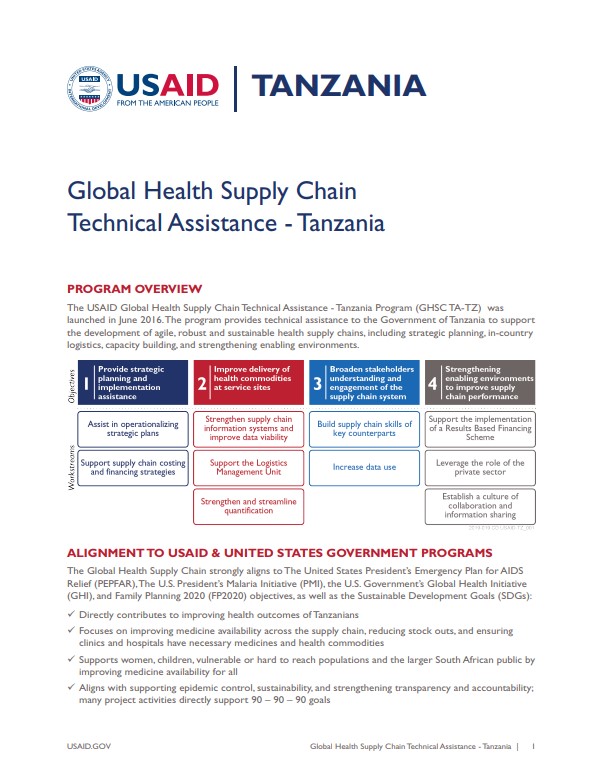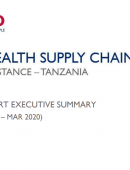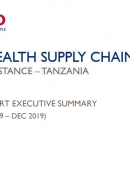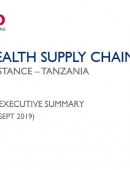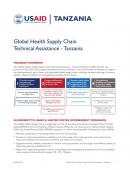USAID Global Health Supply Chain Technical Assistance – Tanzania (GHSC TA-TZ) provides specialized technical assistance to the Government of Tanzania (GoT) to strengthen country supply chain systems across priority public health programs such as malaria, HIV/AIDS, tuberculosis, family planning, and maternal, newborn and child health. The overall goal of the program is to improve government delivery of healthcare services through an agile, responsive and effective health supply chain. GHSC TA-TZ assists GoT health programs and stakeholders across 4 objectives by (1) providing strategic planning and implementation assistance to the government, (2) improving delivery of health commodities in service sites, (3) broadening stakeholders' understanding and engagement of the supply chain system, and (4) creating an enabling environment to improve supply chain performance.

By focusing on quality of data – and the data value chain – the program aims to improve transparency and accountability, inform strategic planning, identify effective supply chain improvements, and provide value to all health supply chain stakeholders. In addition, by strengthening the enabling environment through health financing and governance and accountability, this will help to ensure sustainability of supply chain transformation activities.
The project works to align stakeholders on national supply chain objectives, hold them accountable for their contributions towards strategic plans, and promote deliberate and routine integration of costing and financing components into supply chain interventions and activities.
The Logistics Management Unit (LMU) is a structure that was established by the GoT, with support from USAID and the Global Fund, to coordinate supply chain activities of different programs under one unit. GHSC TA-TZ, in addition to providing technical assistance to the central level LMU, has supported the operations of the LMU at the zonal level in mainland Tanzania and Zanzibar. Project team staff are based at the Medical Stores Department (MSD) zonal warehouses, Central MSD and in Dar es Salaam, where they provide a critical link between MSD, MOHCDGEC and health facilities. As ownership of the LMU transitions to government structures, the program is increasingly focusing on building the capacity of government stakeholders to assume some of the tasks and responsibilities that the LMU has historically performed.
GHSC TA-TZ supports the implementation of the electronic logistics management information system (eLMIS), to improve data visibility, the quality of data collected through automated data validation, and use of information. Support for eLMIS is provided in the context of broader support to the Health Information System (HIS) architecture, and the project facilitates integration with Epicor9, DHIS2, the Government of Tanzania Hospital Management Information System (GoTHOMIS), and the Health Information Mediator (an interoperability layer). Technical assistance includes providing eLMIS help desk support, building capacity of GoT staff to provide user support, and in developing dashboards, visualizations, and analytics.
The project places special emphasis on improving data quality, use, and analytics. Efforts to improve data quality include rolling out Information Mobilized for Performance Analysis and Continuous Improvement (IMPACT) teams in selected regions with the objective of building the capacity of district pharmacists to oversee data quality in their review of reports and requisitions, automating data capture at the facility level by integrating facility management information systems with the eLMIS, supporting facilities to directly enter data into eLMIS, coordinating with PO-RALG on identifying facilities and councils who consistently provide low quality data, conducting data quality assessments and supportive supervision activities, and routinely comparing supply chain data with service data.
Collaboration with in-country stakeholders is central to the project’s approach to supply chain strengthening, decision-making, and management. Coordination groups (such as commodity security meetings and technical working groups) provide a mechanism to share supply chain data, align objectives, and facilitate the effective management of commodity-related resources across stakeholders. The project provides quantitative and qualitative data on supply chain performance to these groups to promote information sharing and the use of data for decision making.
Other areas of focus of the project include: providing technical assistance and building capacity in quantification, strengthening the laboratory supply chain, supporting the redesign and implementation of in-country logistics systems, and aiding the implementation of a results-based financing scheme.
Key partners:
Ministry of Health, Community Development, Gender, Elderly and Children; President’s Office of Regional Administration and Local Governments; National AIDS Control Program, National Malaria Control Program, Reproductive and Child Health Services Program, and National Tuberculosis and Leprosy Program; Medical Stores Department; Ministry of Health of Zanzibar; Central Medical Stores, and other partners.
Geography:
GHSC TA-TZ operates nationally – both in mainland Tanzania and in Zanzibar.
